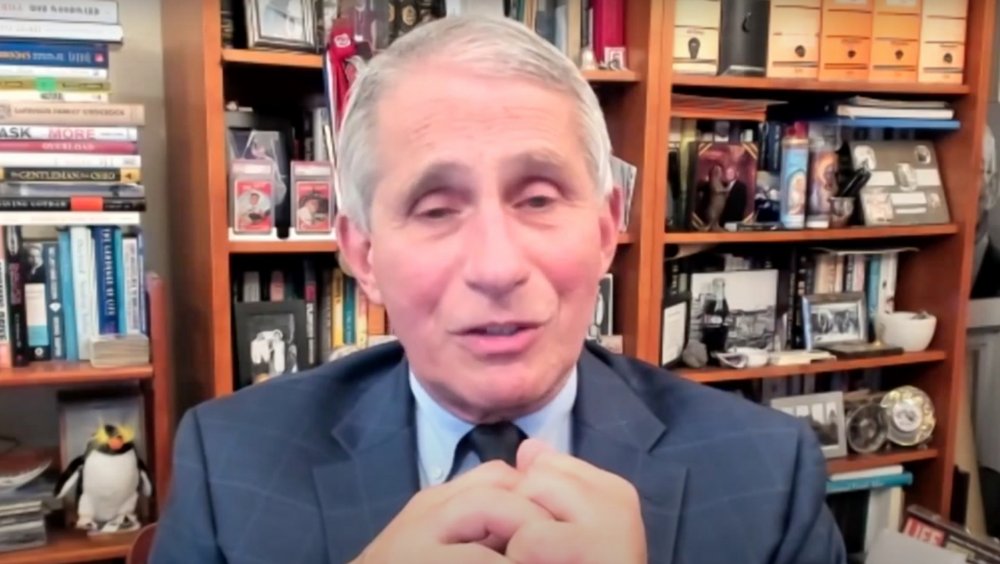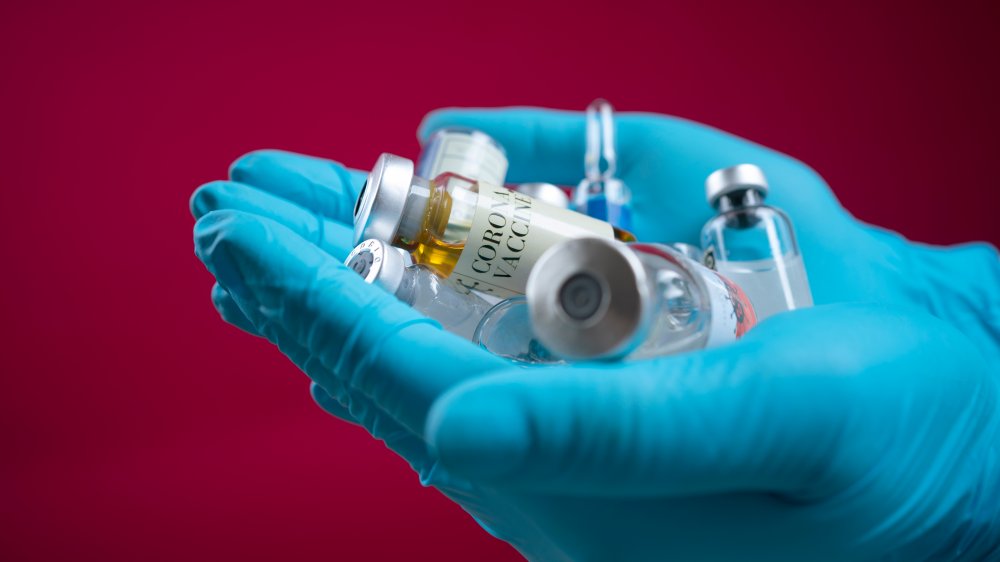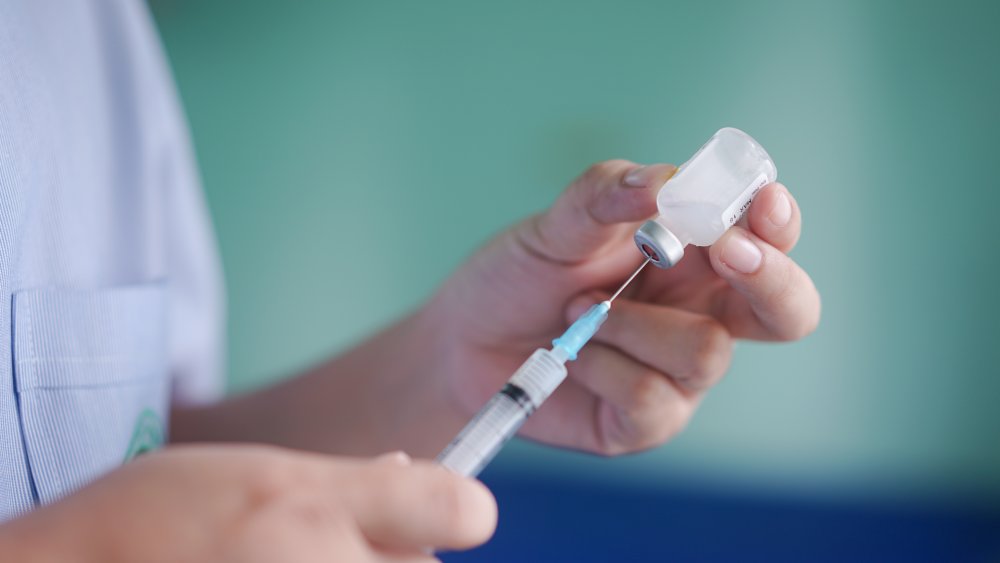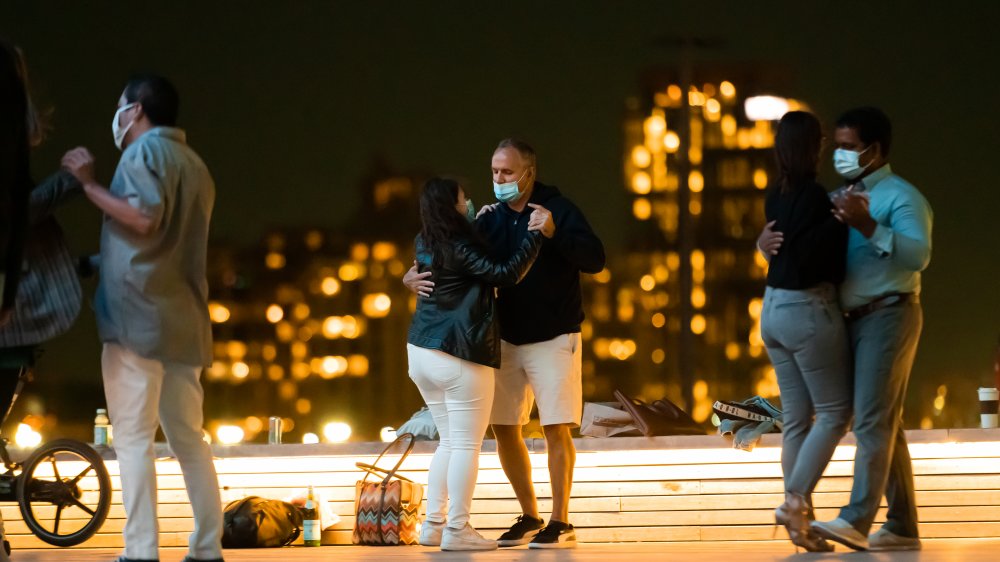Here's When Dr. Fauci Thinks Life Will Get Back To Normal
With the number of coronavirus-related infections and deaths rising across the country, it might be difficult to imagine that life might return to normal. But as with everything related to the pandemic, the country's pandemic expert, Dr. Anthony Fauci says a return to normalcy depends on what we do to get the country there. "This is not over," Fauci told The Berkeley Forum. "We are entering into the cool months of the winter, and our baseline of infection is around 40,000 per day, which is unacceptably high. So we're going to have to get that down, or otherwise, we're going to have a very tough winter in the next few months" (via YouTube).
As far as a return to life-as-we-used-to-know-it is concerned, Fauci also says, "It's not like turning a light switch on or off at all. And even with a vaccine, again, a vaccine is not going to be 99 percent effective. I'd love it to be but it's not. [Because] 99 percent of the people are not going to be vaccinated, they're not going to be want to be vaccinated."
Because of this, Fauci says we are likely to go "into a softly, graded degree of normality." He describes a scenario where businesses will stay open, and where people will likely still need to wear masks, and that if "we were to get a good vaccine now, we could have some degree of normality by the third to fourth quarter of 2021."
Other infectious disease experts are less optimistic than Dr. Fauci
Other infectious disease experts may be even less optimistic than Dr. Fauci about providing a timeline that projects a return to normalcy. Johns Hopkins University infectious disease specialist W. David Hardy tells Healthline that society as a whole can start feeling normal again under very specific circumstances, and that is "when there is strong scientific evidence that the vaccination has rendered 65 to 70 percent of the population, that would be the time."
There's one other critical component Hardy says the United States needs to be able to reopen safely. "It's going to take an understanding and trust in that the science really has progressed since January. People need to trust that the 'this is completely unknown' part of this has passed. That's no longer true. The amount of research that has gone into this has been tremendous," he said.
Hardy adds: "I am old enough to remember the polio vaccine. Everyone stood up, stood in line, and got that. I hope we will do that this time, too. From the top down, all government needs to be careful to not throw doubt into this," he said. "When our leaders propose conspiracy theories, it gets us no closer to that goal of normal."
The public is wary of a vaccine, doctor says
Another infectious diseases expert, Vanderbilt University School of Medicine's William Schaffner, agrees with Hardy, saying that the virus isn't just going to disappear and that the public doesn't appear too excited about vaccines. "Current surveys indicate that half the population is reluctant to vaccinate [for COVID-19]. "They're wary. They're going to wait to roll up their sleeve," he said (via Healthline).
People may be wary for a good reason. Even after the vaccines are administered, Schaffner has already said that they don't know how long any immunity might last, and how effective it actually will be in keeping illness at bay. And while vaccines are expected to be safe, they can also cause side effects including allergic reactions.
"It's important for people, if there would be side effects, that they get compensated," Paul Stoffels, the Chief Scientific Officer for Johnson & Johnson told The Wall Street Journal. "But for the industry to make multiple billion vaccines available, you also have to have liability protection for companies." The U.S. government has paid more than $4.4 billion over three decades for vaccines that have gone wrong, which comes to about $585,000. Compensation arising from COVID vaccinations are likely to pay less than half that. An existing vaccine fund pays out just $207,000 per case.
Dr. Fauci has not wavered on masks and social distancing
In a separate interview with PBS, Fauci referred to COVID-19, as "a formidable virus that has an extraordinary capability of being transmitted from person to person. But the kind of outbreak that we had in the United States and that many other countries have had does not necessarily have to have been inevitable."
To keep caseloads down as we head into colder months, Fauci is asking everyone to do the same thing he has said all along: "I would say something that I have said multiple times, and I have no problem repeating it now, that what you should do to avoid acquisition and transmission of infection is the universals wearing of masks, avoiding close contact, avoiding crowded situations, trying to do things outdoors much more than indoors, and washing your hands regularly." It's a call other doctors like Drs Schaffner and Hardy are all too willing to support.
During the first week of October, The New York Times reported high case numbers across most of the country, with new infection surges in the upper Midwest and the West, although the national number of new cases is down from a high of more than 60,000 a day in late July. The outbreak appears to be increasing in Wisconsin, North Dakota, South Dakota and Utah, while Arizona, Florida, and California have seen their case numbers fall. As of October 9, 2020, there were 7.6 million cases, and more than 210,000 deaths.



